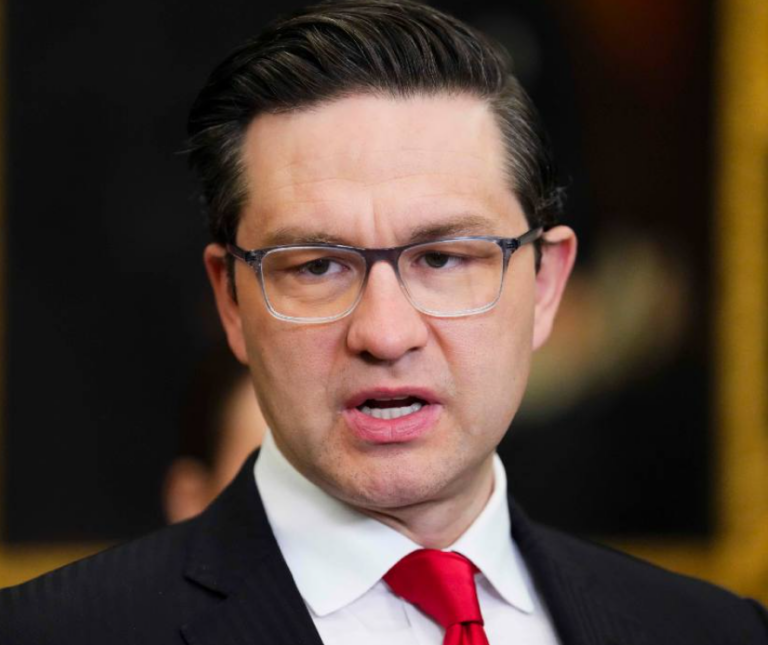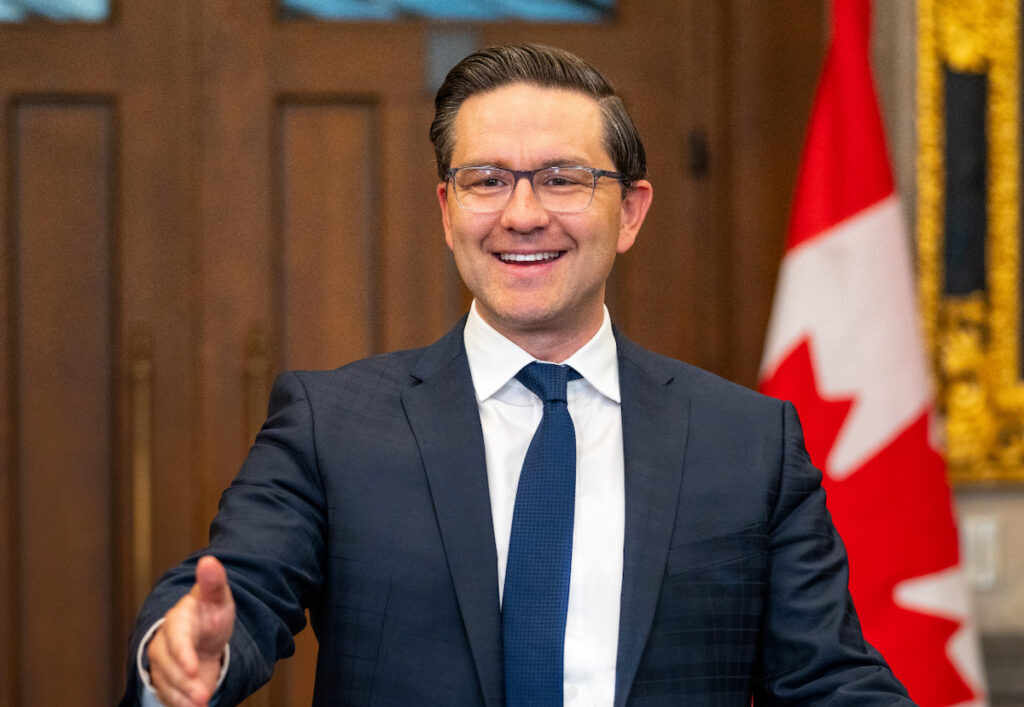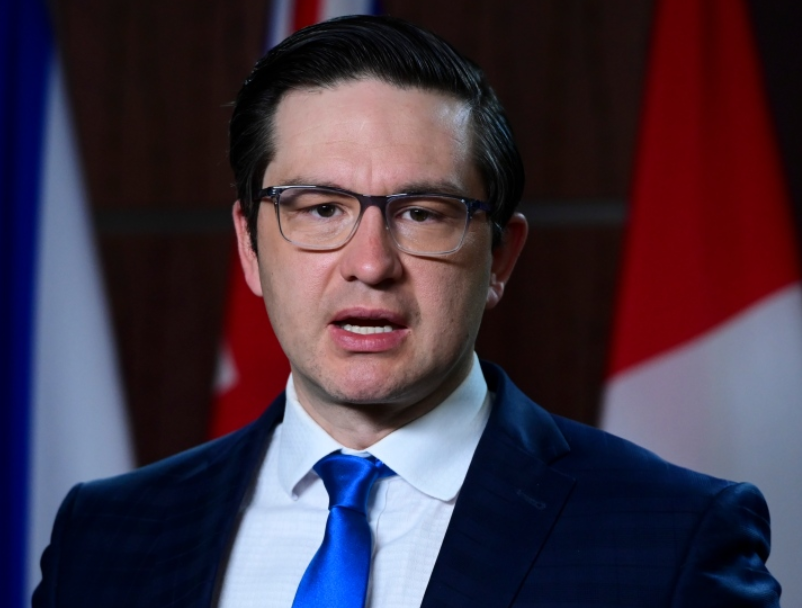Does Pierre Poilievre Speak French? The Truth & More!
Does a politicians linguistic ability truly matter? For Pierre Poilievre, the leader of the Conservative Party in Canada, the question of whether he speaks French, and how well, has become a surprisingly significant point of discussion, shaping perceptions of his identity and political prospects.
This question, "Does Pierre Poilievre speak French?" isn't merely about linguistic proficiency; it's a query that delves into the heart of Canadian identity and political strategy. In a nation as linguistically diverse as Canada, a leader's ability to communicate in both official languagesEnglish and Frenchcan be a defining factor in their appeal and electability. The intrigue surrounding Poilievre's French skills stems from the understanding that it directly impacts his connection with Quebec, a province crucial for any party aspiring to form a national government. His fluency, or lack thereof, becomes a symbol of his commitment to the bilingual fabric of the country. The subtleties of accent, grammar, and vocabulary used in French can reveal much about a speaker's background, cultural understanding, and respect for the language and its speakers. For Poilievre, mastering French is not merely a communication tool but a bridge to understanding and representing the diverse perspectives within Canada.
| Full Name | Pierre Marcel Poilievre |
| Born | 1979, Calgary, Alberta, Canada |
| Nationality | Canadian |
| Political Party | Conservative Party of Canada |
| Current Role | Leader of the Conservative Party of Canada |
| Spouse | Anaida Galindo |
| Children | Two |
| Education | University of Calgary (Bachelor of Arts in Communications) |
| Career Highlights | Member of Parliament for Carleton (formerly NepeanCarleton) (2004-Present), Minister for Democratic Reform (2013-2015) |
| Personal Background | Grew up in Calgary; known for his fiscally conservative views and advocacy for free markets. |
| Official Website | Conservative Party of Canada - Pierre Poilievre |
Pierre Marcel Poilievre, born in Calgary in 1979, embarked on his political journey early in life. He was first elected to the House of Commons following the 2004 federal election, representing the riding of NepeanCarleton. He continued to serve his constituents, being re-elected in 2019 and 2021 in the same riding, now known as Carleton. Throughout his career, Poilievre has become a prominent figure in Canadian politics, known for his articulate stance on economic issues and his commitment to conservative principles. Understanding whether Pierre Poilievre is French or has French roots allows for a deeper appreciation of the cultural influences that have shaped his political persona. As we delve into the details of his life, it's essential to explore his biography, personal details, and contributions to Canadian politics to understand the man behind the political figure.
- Kannada Movies Online Watch Free Download Movierulz More
- Movierulz Watch Latest Telugu Bollywood South Movies Online Year
Much has been made of how well Poilievre himself speaks French a skill that arguably places him ahead of many of his recent predecessors. His ability to speak passable French, for which he deserves credit, didn't originate from a Fransaskois father but from lessons offered to members of parliament and from diligent practice. Ultimately, Pierre Poilievre's ability to speak French is more than just a language skill; it reflects his identity as a Canadian politician. In a country where bilingualism is not only valued but often expected, mastering the French language can open doors and bridge cultural divides.
The Conservative leadership candidates squared off in French during the second official debate of the race, which saw heated exchanges between Jean Charest and Poilievre. This linguistic face-off highlighted the importance of French proficiency in Canadian politics, especially within the context of leadership races. Public figures are mindful of this, and in Pierre Poilievre's case, correct pronunciation underscores respect and understanding. Mastering the nuances of the French language isn't just about communication; it's about demonstrating a genuine respect for the culture and its people.
Poilievre referenced his love for his wife and his appreciation for her modest immigrant roots. Revealingly, he also shared that he and his wife are raising their two young children to speak French and Spanish at home, noting that English would be their third language. This linguistic upbringing underscores Poilievre's commitment to multiculturalism and bilingualism within his own family. In 2017, he married Anaida Galindo, a vivacious, intelligent Venezuelan immigrant from Montreal who speaks excellent French and was working on parliament.
- Kannada Movies Online Watch 2023 Hits Movierulz Alternatives
- Movie Mania Telugu Films Movierulz Streaming In 20242025
Thats the answer many in conservative circles give these days when theyre quizzed about why party leader Pierre Poilievre does or says something that observers struggle to understand. It appears that the intricacies of political communication often hinge on understanding the cultural context and linguistic nuances at play.
While some, such as Peter MacKay and Pierre Poilievre, are having the quality of their French evaluated by people who dont actually speak the language, and having their evaluations challenged by others, the broader conversation is about the importance of bilingualism in Canadian politics. The proficiency of political figures like Poilievre in French becomes a subject of scrutiny and debate. Users share their opinions on how good Pierre Poilievre, a Canadian politician, speaks French. Some say he has a rusty accent and grammar errors, while others praise his effort and respect for the language. These varying opinions underscore the subjective nature of language assessment and the impact of personal biases on perceptions of fluency.
To a Quebecer, Poilievres accent is clearly that of an anglophone, and he speaks a French that is basically a direct translation of what he says in English (he seems to think in English). Justin Trudeau, on the other hand, is as elite Francophone Quebec as you can get. The comparison highlights the spectrum of French language proficiency and cultural background within Canadian politics.
Despite not having a Fransaskois background, Poilievres ability to speak passable French, for which he deserves credit, came not from his father but from lessons offered to members of parliament and from diligent practice. This demonstrates the importance of ongoing learning and self-improvement in mastering a second language.
The debate surrounding Pierre Poilievre's French language skills transcends simple linguistic evaluation; it reflects broader cultural, political, and personal dimensions that shape his identity as a Canadian politician. While some observers might nitpick his accent or grammatical errors, others commend his efforts and respect for the language. These diverse opinions highlight the subjective nature of language assessment and the cultural nuances that influence perceptions of fluency. Ultimately, Poilievre's commitment to learning and using French underscores his recognition of its importance in connecting with Quebecers and representing the diverse voices within Canada. In a nation where bilingualism is celebrated and valued, mastering the French language is not just a skill but a bridge to understanding and unity.
Born and raised in Calgary, Alberta, Pierre Poilievre's journey to mastering French is a testament to his determination and adaptability. Unlike some politicians who grew up in bilingual environments, Poilievre's exposure to French came later in life, through dedicated study and immersion. His efforts to learn and speak French have not gone unnoticed, and many Canadians appreciate his willingness to embrace the country's linguistic duality. However, opinions on his fluency vary widely, with some praising his efforts and others pointing out his accent and occasional grammatical errors.
For those who criticize Poilievre's French, the focus is often on his accent and the occasional grammatical errors that betray his Anglophone background. To native French speakers, his accent is unmistakably that of an Anglophone, and his sentences sometimes sound like direct translations from English. These critiques highlight the challenges faced by individuals who learn a second language later in life, particularly in mastering the subtle nuances of pronunciation and grammar. However, even critics acknowledge that Poilievre's effort to speak French is commendable and shows respect for the language and its speakers.
On the other hand, many Canadians appreciate Poilievre's efforts to speak French, viewing it as a sign of respect and a commitment to the country's bilingual identity. They acknowledge that learning a second language is not easy, and they commend Poilievre for taking the time to improve his French skills. Supporters also point out that fluency is not the only measure of language proficiency, and that effective communication is more important than perfect grammar or pronunciation. By speaking French, Poilievre demonstrates his willingness to engage with Quebecers and understand their perspectives.
Ultimately, the debate surrounding Pierre Poilievre's French language skills boils down to different expectations and perspectives on what it means to be bilingual in Canada. For some, fluency is a prerequisite for any politician aspiring to national leadership. For others, effort and respect are more important than perfection. Regardless of where one stands on this debate, it is clear that Poilievre's French language skills have become a significant part of his public image and political identity.
Looking ahead, Pierre Poilievre's ability to continue improving his French language skills will likely play a role in his future political success. As he seeks to broaden his appeal beyond his Conservative base, connecting with Quebecers will be essential. Whether he can overcome the criticisms of his accent and grammatical errors remains to be seen. However, his commitment to learning and speaking French is a positive step in the right direction.
His mastery of French is not simply a matter of linguistic proficiency; it's about building trust and rapport with Quebecers, who often feel that their language and culture are not adequately represented in federal politics. By speaking French, Poilievre signals his willingness to engage with Quebecers on their own terms and to understand their unique perspectives. This can be particularly important in addressing issues such as Quebec's cultural distinctiveness, its relationship with the federal government, and its role in the Canadian federation.
Moreover, Poilievre's French language skills can also help him communicate more effectively with francophone communities outside of Quebec. In provinces like Ontario and New Brunswick, where there are significant French-speaking populations, Poilievre's ability to speak French can help him connect with these voters and demonstrate his commitment to linguistic duality. This can be particularly important in regions where linguistic tensions have historically been high, and where political leaders need to show sensitivity and understanding towards both English and French speakers.
Beyond its electoral implications, Poilievre's French language skills can also enhance his credibility on international issues. As Canada seeks to play a more prominent role on the world stage, having political leaders who can communicate effectively in multiple languages can be a significant asset. French is one of the official languages of the United Nations and is widely spoken in international diplomacy. By speaking French, Poilievre can engage with foreign leaders and diplomats more effectively, and he can help Canada project a more multilingual and multicultural image to the world.
Furthermore, Poilievre's French language skills can also contribute to national unity within Canada. In a country that has often struggled with linguistic and cultural divisions, having political leaders who can bridge these divides is essential. By speaking French, Poilievre can help promote a sense of shared identity and belonging among Canadians of all backgrounds. This can be particularly important at a time when there are growing concerns about regionalism and separatism in some parts of the country.
The question of whether Pierre Poilievre speaks French, and how well, is not just a matter of linguistic curiosity. It is a question that touches on the very essence of Canadian identity and political leadership. By learning and speaking French, Poilievre has taken a significant step towards connecting with Quebecers, engaging with francophone communities across Canada, and projecting a more multilingual and multicultural image to the world. While there may be debates about his accent and grammar, there is no denying that his commitment to French is a testament to his understanding of the importance of linguistic duality in Canada.
Its important to note that the evaluation of someones language skills, particularly in a political context, is often subjective and influenced by various factors. For instance, native speakers may have higher standards and expectations compared to those who are not fluent in the language. Additionally, regional accents and dialects can also impact how someones French is perceived. A politician from Quebec, for example, may have a different accent and vocabulary compared to someone from France, and these differences may be judged differently by different audiences.
Furthermore, the political context in which language skills are evaluated can also play a role. During election campaigns and debates, candidates language abilities are often scrutinized closely by the media and the public. Mistakes and mispronunciations can be amplified and used as ammunition by political opponents. On the other hand, a politician who demonstrates a genuine effort to speak French, even if their skills are not perfect, may be seen as more sincere and relatable by voters.
In the case of Pierre Poilievre, his efforts to learn and speak French have been both praised and criticized. Some have commended him for taking the time to improve his language skills, while others have pointed out his accent and grammatical errors. However, it is important to remember that language learning is a process, and that even native speakers make mistakes from time to time. The fact that Poilievre is making an effort to speak French should be seen as a positive sign, regardless of whether his skills are perfect.
Moreover, it is worth noting that language skills are not the only factor that voters consider when choosing a political leader. Other factors, such as policy positions, leadership qualities, and overall competence, are also important. While language proficiency can certainly be an asset, it is not necessarily a prerequisite for success in politics. There have been many successful political leaders in Canada and around the world who were not fluent in multiple languages.
Ultimately, the question of whether Pierre Poilievre speaks French, and how well, is a complex one with no easy answer. While some may focus on his accent and grammatical errors, others may appreciate his effort to learn and speak the language. Regardless of ones personal opinion, it is clear that Poilievres French language skills have become a topic of discussion in Canadian politics, and that they may play a role in his future political career.
In the broader context of Canadian society, the emphasis on bilingualism reflects the country's commitment to multiculturalism and inclusivity. Canada is officially a bilingual nation, with both English and French recognized as official languages. This means that government services and documents are available in both languages, and that Canadians have the right to communicate with the government in the language of their choice. The emphasis on bilingualism also extends to education, with many schools offering French immersion programs and encouraging students to learn both languages.
However, the reality of bilingualism in Canada is more complex than the official policy suggests. While many Canadians support the idea of bilingualism in principle, the actual level of fluency in both languages varies widely. In some parts of the country, particularly in Quebec, French is the dominant language, and most residents are fluent in French. In other parts of the country, English is the dominant language, and French proficiency is less common. This can lead to linguistic tensions and misunderstandings, particularly in areas where there are significant populations of both English and French speakers.
In addition to the linguistic divide, there are also cultural and historical factors that contribute to the complexities of Canadian identity. Canada has a diverse population with people from all over the world, each with their own unique languages, cultures, and traditions. This diversity is a source of strength for Canada, but it also presents challenges in terms of integration and social cohesion. Balancing the rights and needs of different linguistic and cultural groups is an ongoing process, and it requires sensitivity, understanding, and a willingness to compromise.
As Canada continues to evolve as a nation, the importance of linguistic duality and cultural diversity will only grow. Political leaders like Pierre Poilievre have a responsibility to promote understanding and respect between different linguistic and cultural groups. By learning and speaking French, Poilievre is demonstrating his commitment to these values, and he is setting an example for other Canadians to follow. Whether his French skills are perfect or not, his effort to embrace bilingualism is a positive step towards building a more inclusive and united Canada.
- Vegamovies Adult Content What You Need To Know 2024
- Stream Movies Online Free Sites Legal Options Explored

Pierre Poilievre Does He Speak French? His Background & Skills

Pierre Poilievre Does He Speak French? His Background & Skills

Pierre Poilievre Does He Speak French? His Background & Skills